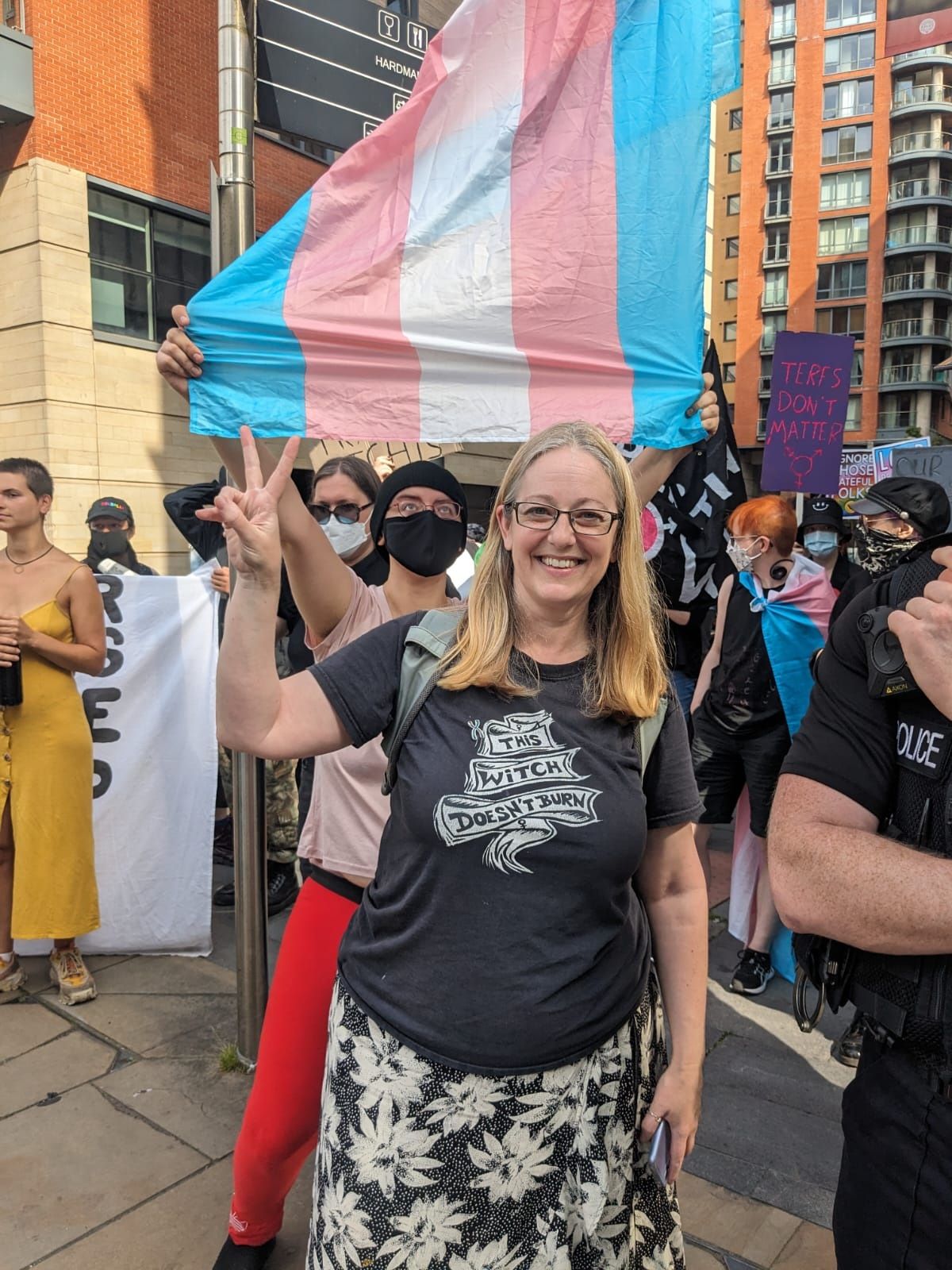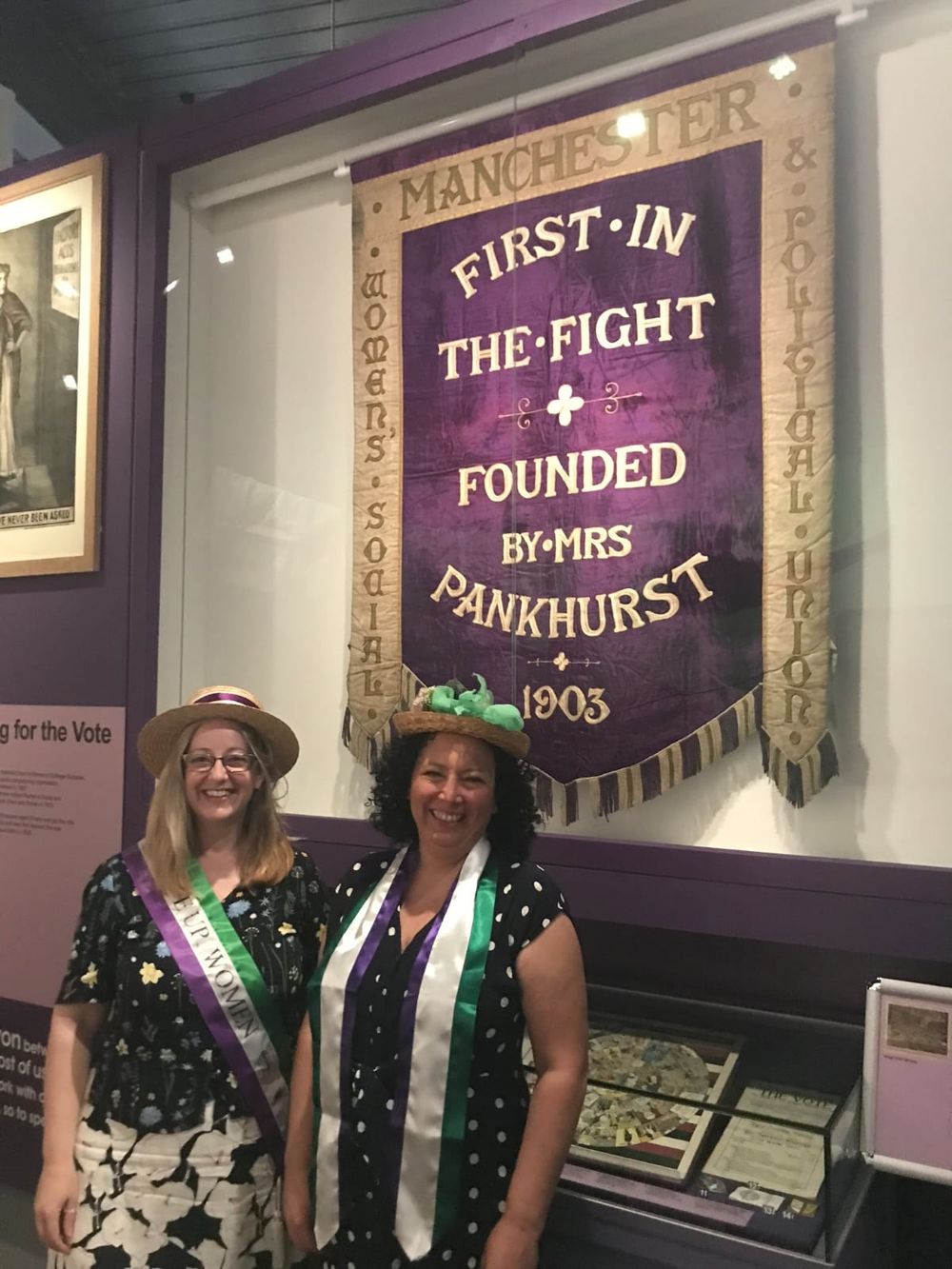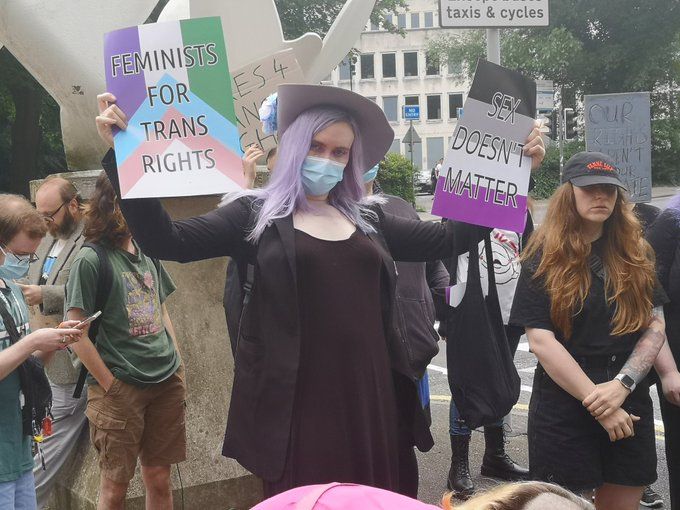Joyce activated, issue 60
On Sunday, I and other Sex Matters team members held a teach-in on equality and human-rights law at the People’s History Museum. That's the lovely place that holds the finest collection anywhere of Suffragette materials. What could go wrong...?

Once again I have to apologise for my lateness in getting a newsletter out. For the past several months I have had a short-term research contract running alongside my work for Sex Matters, and managing my various commitments has been extremely difficult.
If you are not a subscriber to my weekly newsletter, you might like to sign up for free updates. I hope that in the future you might consider subscribing.
Well, that work wrapped up on Tuesday last, and afterwards I felt like I could once again come up for air. And by Saturday evening, as I got off the train in Manchester, in preparation for an event on Sunday morning at the People’s History Museum, I had a newsletter mostly written, with the plan of finishing it on the journey back.
Best-laid plans, and all that…
The event was a follow-up to the Sex Matters board meeting, which we held in late June, in a lovely private room that the museum hires out. I wrote about what happened afterwards in issue 53—in brief, after an online mini-whingefest from about three-and-a-half people, the museum abjectly apologised for renting us a room. It put out a statement in which it begged to be given time to rebuild the trust of the “wider LGBTQI+ community and all people who face marginalisation” and promised to “learn from” its terrible error in accommodating an organisation that does not “share its values”, an error it promised never to repeat.
That, of course, constituted an explicit pledge to commit unlawful belief discrimination. In UK law it was precisely the same as stating publicly that you were deeply sorry for allowing a Muslim or Jewish group to hire a room, and that you would never do so again.
To be clear, we didn’t book at the People’s History Museum to make some sort of point. We decided to have the quarterly meeting in Manchester because two of our board members live there, and there was a general agreement that the rest of us should do the travelling for once. And we picked the People’s History Museum because it’s lovely, and about precisely the sort of history we feel part of. It holds one of the most important collections of Suffragette materials, including the Pankhursts’ “First in the Fight” banner. The battle for female suffrage was a story of female courage and a too-small number of male allies, on the one hand, and male supremacy and female complicity, on the other. I’m sure you can see why that period resonates.

The museum staff couldn’t have been lovelier and more helpful on the day of our board meeting. We made sure they knew who we were well in advance, and they seemed unbothered. We genuinely thought: Oh, how lovely; the message is getting through that acknowledging biological sex isn’t bigoted, and perhaps sanity is returning. After the meeting Maya and I took some pictures with the Suffragettes banner, which we tweeted thanking the museum and recommending that people visit.
So it was a slap in the face being treated, almost immediately, to the usual denunciations. But also an opportunity for a teachable moment: we immediately asked to book another room. At that point the museum presumably talked to its lawyers; at any rate it quickly took down its discriminatory statement and accepted our booking. And so we picked a date and decided to use the booking for a “teach-in” on the Equality Act and other parts of human-rights law relevant specifically to women’s rights—which seemed relevant. The tickets sold out within three hours.
Very depressingly, the museum then took a series of steps to signal its ongoing capitulation to those complaining about us exercising our legal rights. It came off social media. It took down the bookings page from its website. And, most extraordinarily, it rewrote its entire mission statement, in the process removing any claim it had to be a fit home for the most important archive on the Suffragettes.
Here’s the “before”, from its website in June.


And here’s after, in August (I can’t find the page at all now):


And thus it was that a museum dedicated to the long struggle for democracy and human rights for all decided, when asked to support precisely such a struggle, to fold. Even after being given a legal reason to stand firm, it instead decided to do the minimum possible to avoid being taken to court, and to continue to signal capitulation. And how did it resolve the cognitive dissonance between the stirring words of its mission and its actual pusillanimity? By reneging on the stirring words. That’s not what we wanted to happen. We want organisations to re-find their backbones, not to admit to themselves and others that they have been lost for good.
We knew there was going to be a protest on the day, because it was advertised on Twitter. I’ll skip the details, because we are still talking to the museum and the police about it, but suffice it to say that the protesters were loud, aggressive and permitted to set up directly in front of the entrance to the museum so that attendees had to walk in between them, as they shouted insults and waved banners in people’s faces. Still, everyone made it inside and the event went really well.
We found out afterwards that there had been a lot of noise, presumably in an attempt to disrupt our talk. But we were on the other side of the building, and didn’t hear anything.
It was what happened afterwards that was upsetting. Rather than letting us walk around the exhibits, as we had told them we planned to, the museum insisted on us all leaving straight away in a single group, so that we wouldn’t have to run the gauntlet again. In fact, as we found out as soon as we left, the protestors were waiting for us just a few metres away. And when we walked away they followed us, shouting and chanting. The five policemen on duty were nothing like enough to hold them back.

We took photos and shot lots of video. It was all quite surreal, as everyone strolled along—Maya and I had a lunch engagement; other attendees wanted to head to a pub and chat—and these horrible people crowded up behind us shouting slogans through a megaphone. Pretty personalised slogans, too: “Fuck Helen Joyce, my body, my choice”, for example.
Oh well. In the end the police called a car, and Maya and I, plus Emma Hilton, our board member and a Manchester local, were whizzed away—my first time in a cop car with the siren on. He dropped us across the road from the restaurant where we were having lunch, and as we crossed the road a woman in a car rolled down her window and screamed “Fascist scum” at us. So that was nice too.
I wonder how different things would have been if the museum had simply ignored the initial complaints, instead of responding with abject apologies for letting women who were barely better than Nazis into the building. Because after that, its response to everything that followed was foreordained. How can you tell protestors to keep the entrance clear, and keep the museum open and call police to eject any troublemakers, when you think the protestors shouting obscenities through megaphones are the good guys and the nasty women talking about human-rights law are the baddies? You’ve placed yourself, to coin a phrase, on the wrong side of history.
I also wonder how, somehow, Sarah Jane Baker has been turned into a cause celèbre of transactivism. A man who served 30 years for kidnap, torture and attempted murder, and celebrated being out on licence by shouting at a crowd that if they see a TERF, they should “punch them in the fucking face”...
It was an interesting experience, and not one I want to repeat in a hurry. I didn’t feel scared as such while it was happening—too much adrenalin, I guess. But I couldn’t think clearly, and couldn’t work out where I was or what I should do next. I kept accidentally taking short videos when I intended to take photos. And when it became clear that the police had no idea how to bring the whole thing to an end, I really started to worry.
The videos I and others took show both myself and Maya smiling broadly. That was obviously partly bravado—but also a feeling of incredulity at the sheer ridiculousness of the whole thing. Here’s that tosspot Billy Bragg’s take, just for a contrary view. This is a man who has signed the White Ribbon promise to “never use, excuse or remain silent about men’s violence against women”.
How it started >>>> how it’s going pic.twitter.com/BElvQz9R5D
— Bertha Dalziel (high value man) (@BertDalziel) September 12, 2023
After getting out of the police car and sitting down to lunch, I had no appetite. I didn’t feel safe until I had left Manchester (a journey that involves going past endless Progress Pride flags emblazoned “everyone welcome”—so Orwellian). By then I had a splitting headache, and the next day I felt wrung out.
So, sorry that this is late. I suppose it’s good to keep giving these awful, awful people more opportunities to show their true colours. But it’s not massively enjoyable to be the target. Still, I’m not going to back down—and we’ll be doing more events at the People’s History Museum.
If you would like to become a paid subscriber and receive full access to my weekly newsletter, you can sign up here.